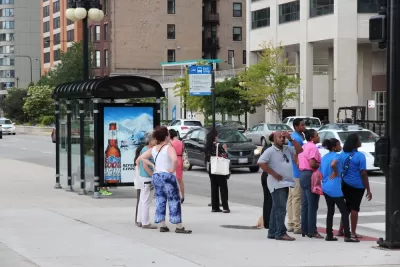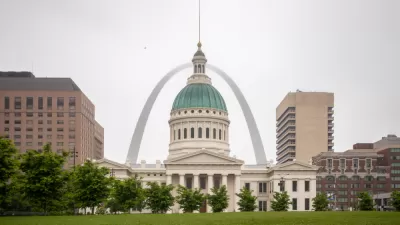Two companies focusing on hyper-local trips want to bring more transit and services within reach of Chicago’s underserved Black neighborhoods.

Two Black-owned Chicago companies want to use on-demand transportation to fill critical gaps in the city’s transit infrastructure. As Audrey F. Henderson writes in NextCity, Jitney EV and GEST are harking back to the informal jitneys that served Black residents when white cab companies often wouldn’t. Now, the two companies hope to bring electric, on-demand transportation to some of Chicago’s most underserved neighborhoods.
The services are not meant to compete with long-distance transportation to places like the city’s airports or suburbs. Rather, they’re designed to provide the short trips that many taxi and ride-hailing operators don’t want to make. “Their efforts are specifically targeting the ‘last mile’ gap between public transit stops and destinations such as grocery stores, banks and entertainment, along with providing an option for reliable transportation to and from work for residents within its service area,” said William “Billy” Davis, general manager for Jitney EV.
While it could be argued that more car-based services, even electric ones, could add to congestion, the companies argue that “Hyperlocal services could be a key factor in the ultimate goal of not only eliminating gasoline vehicles, but of reducing dependence on cars in the first place.” Meanwhile, free rides can connect more residents to jobs and essential services without the burden of transit costs.
FULL STORY: Black-Owned Companies Seek To Close Chicago’s Electric Transportation Gaps

Alabama: Trump Terminates Settlements for Black Communities Harmed By Raw Sewage
Trump deemed the landmark civil rights agreement “illegal DEI and environmental justice policy.”

Planetizen Federal Action Tracker
A weekly monitor of how Trump’s orders and actions are impacting planners and planning in America.

The 120 Year Old Tiny Home Villages That Sheltered San Francisco’s Earthquake Refugees
More than a century ago, San Francisco mobilized to house thousands of residents displaced by the 1906 earthquake. Could their strategy offer a model for the present?

LA’s Tree Emergency Goes Beyond Vandalism
After a vandal destroyed dozens of downtown LA trees, Mayor Karen Bass vowed to replace them. Days later, she slashed the city’s tree budget.

Sacramento Leads Nation With Bus-Mounted Bike Lane Enforcement Cameras
The city is the first to use its bus-mounted traffic enforcement system to cite drivers who park or drive in bike lanes.

Seattle Voters Approve Social Housing Referendum
Voters approved a corporate tax to fund the city’s housing authority despite an opposition campaign funded by Amazon and Microsoft.
Urban Design for Planners 1: Software Tools
This six-course series explores essential urban design concepts using open source software and equips planners with the tools they need to participate fully in the urban design process.
Planning for Universal Design
Learn the tools for implementing Universal Design in planning regulations.
Ada County Highway District
Clanton & Associates, Inc.
Jessamine County Fiscal Court
Institute for Housing and Urban Development Studies (IHS)
City of Grandview
Harvard GSD Executive Education
Toledo-Lucas County Plan Commissions
Salt Lake City
NYU Wagner Graduate School of Public Service




























